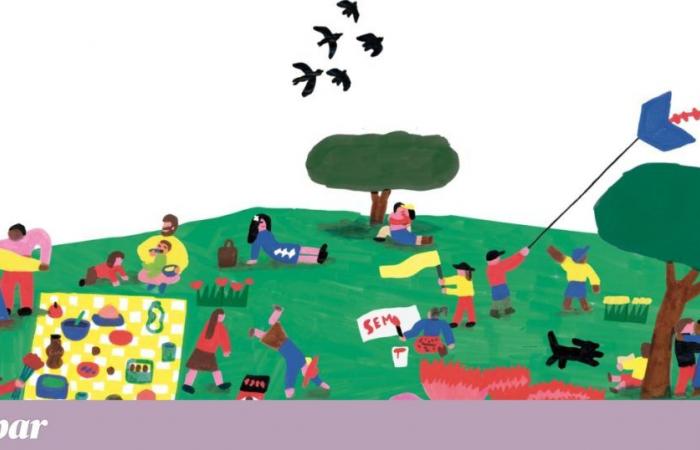This is how the book begins Ever!: “It was an unhappy country divided between the sea and war, between goodness and mist. They wanted a future country where life was possible, but with each step taken they returned to the past. In short, In that country, the day seemed to be night, even though the morning dawned. Today was followed by yesterday: tomorrow never came again.”
Part of the collection of 12 books published by the Assembly of the Republic to mark the 50th anniversary of the 25th of April and which combines “brushes with letters and colors with laws”, Rita Taborda Duarte puts the youngest in contact with a girl who She was born far from her father, who was imprisoned in Peniche, and who was only able to see her for the first time through “a dull, thick glass that wouldn’t break for anything”.
He was arrested by PIDE, here with the acronym decoded as “Incredibly Destitute and Stupid Police”, instead of the official designation International and State Defense Police.
He dedicates the book to his father, Mário de Carvalho, and his mother, Maria Helena Taborda Duarte, and tells PÚBLICO, via email: “I’m a little older than Abril (I was born on April 26, 1973), but her memory (historical and family and, therefore, personal, even if it’s not direct memory) is very deeply rooted in me.”
Madalena Matoso
However, he adds, “the prospect of writing this book did not fill me with joy, but with strong anguish (many incredible books have already been written about April. João Pedro Mésseder, Manuel António Pina, Matilde Rosa Araújo, etc., of so many and wonderful ways and others that continue to come out: there will never be too many)”.
He thought he would prefer not to write it, but he ended up doing it. “I feel this book is an active civic exercise in perpetuating democracy, which is beyond voting. That’s also why I felt the weight of responsibility so strongly,” she says.
He makes a point of highlighting: “Sara Ludovico is the name of this project [Missão: Democracia] something to be grateful for: here, the true work of the Assembly of the Republic is refocused, after April, on democracy, learning and access to culture for all.”
The author, winner of this year’s Fundação Inês de Castro Prize with Not Undoing, says that he tried to camouflage “the history of the country with a personal history, which is made up of interposed memory”. And he reveals: “My parents, when April 25th happened, were exiled in Sweden; the country’s history intersects with my history, with that of my exiled parents (like today so many refugees that we now see arriving in Europe, in Portugal, fleeing war and persecution).”
Madalena Matoso
Poems and hidden characters
Through the narrative, adults will identify memorable phrases related to the revolution, coming from poems and songs. “There is a story that is told and a story that is sung, here, simultaneously. And in that sense, this book is collective: it is mine (also from everyone who conceived and put together this project), but because it is mainly from all the writers, singer-songwriters who hum and sing and declaim literally, even naturally, April between the lines of my words .”
At the end, the sources of the phrases “stolen” from the poems and songs found throughout the book and recorded in italics are revealed. Children are even invited to discover them: “Between the lines of this story, there is a hidden joy, in poems and songs that no one can silence. So go look for them; see if you can sing them.”
There are more secrets in this work, like Lígia. “A hidden character that Madalena Matoso’s complicity made us inhabit even if we can’t see it. It doesn’t enter the story, but it’s there, between the lines: Lígia was the car with registration number LG-72-45 that watched over my father.”
Many of the “rags” inherited from the family memory do not make it into the book. But he made a point of recovering two words: “I recover and invent (I like neologisms; words are few to contain all the complexity of the world) and in the book they serve as a yardstick for Always! Jam and open.”
Madalena Matoso
Closing the book, in the didactic/explanatory pages, he writes: “If neither Rome nor Pavia were created in a single day, the 25th of April did not see its life end just that morning. There is a lot, more and more to be jammed, a lot to clear, many doors to open.” And this is the challenge that is thrown at children and adults at the end.
Draw the “before” and “after”
The illustrator of this title, Madalena Matoso, lets us know the pleasure and responsibility of having participated in the collection. “When we see the books all together, we realize how, based on those ‘big’ themes, the authors of the texts and illustrations created books with very different registers. And this diversity gives this collection a very special identity.”
He explains how the curator, Dora Batalim SottoMayor, “distributed the themes among pairs of people who had never worked together, or by people who do the text and illustration”. Result: “We have books that range from autobiographical stories, comics, illustrated albums, science fiction, everyday stories, stories with adults, with children, non-fiction books, poetic texts, informative texts…” Pleases him.
In the specific case of Ever!, says: “I had never written a book about the 25th of April (there are many good ones) and I had never illustrated a book by Rita Taborda Duarte. I was happy and aware that it was a great responsibility.”
The author of the text told him that she had a personal story related to the topic and wanted to know whether or not it would make sense to tell it. “I really liked that you decided to write about her. The story tells an episode (ugly and beautiful) in her life and that of her family, but it is much more than a family story. It ends up being symbolic and universal, it relates to all of us.”
Madalena Matoso
As for the process, it was no different from the usual: “Reading the text over and over until you almost know it by heart, doing experiments, making a story board, present, develop the illustrations, discuss, review, take the whole into account, put things aside. etc.” But in the text, “The idea of ‘before’ and ‘after’ especially marked her”. So, many of the images revolve around this idea, this contrast. As for the technique, he says, “I used markers and gouache”.
On the back cover, Rita Taborda Duarte concludes: “Once upon a time there was a girl who was born in a time when clocks stopped, but we all know that nothing and no one can stop time.” And tomorrow arrived.
More Letra Pequena articles and Letra Pequena blog






